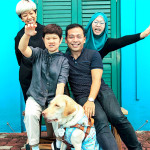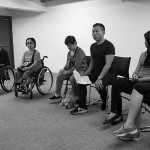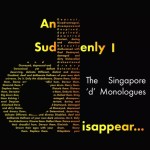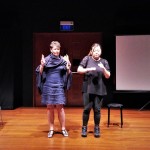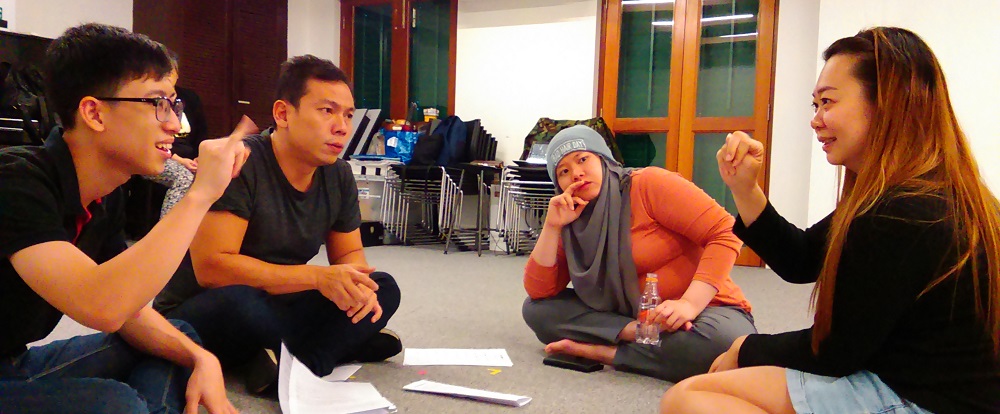
Project Tandem participant Lily Goh (right) communicates with Peter Sau (second from left) and Shai (second from right) through sign language interpreter Too Jun Yee (left).
Project Tandem is one of the first theatre training platforms in Singapore that engages artists from the D/deaf and disabled community. Founded and led by theatre practitioner Peter Sau, it was established in April 2017 with support from Centre 42’s Basement Workshop programme. A closed-door work-in-progress showcase of the team’s first work, Making A Stand, will be taking place at our blue house on 21 and 22 July. But as with any endeavour that breaks new ground, getting things to where they are now has not been easy.
Project Tandem was conceptualised last year when Peter was involved in the creation of a disability-led play, And Suddenly I Disappear – The Singapore ‘d’ Monologues, with UK playwright Kaite O’Reilly. As established D/deaf and disabled performers are almost non-existent in Singapore, Peter decided to search for emerging talents through his network of contacts. He identified 13 people to join him in a pilot training last year, and four of them were invited to perform in And Suddenly I Disappear. This experience made him realise that there is currently a lack of platforms to support D/deaf or disabled artists in Singapore, resulting in a lack of fair representation. So he came up with the idea of forming a collective – Project Tandem – as a cost-free training ground to develop their skills, and increase their presence on the Singapore stage.
The participants took part in 10 sessions of workshops last year that concluded with each of them presenting a short closed-door showcase at Centre 42 in September 2017. Since January this year, Peter and his team have started working towards the creation and staging of an original work – Making A Stand – after securing funding from the National Arts Council’s Creation Grant. The piece comprises two segments: the first is a personal story that each of Project Tandem’s emerging artist will deliver, which is co-created by them and the project’s lead writer and dramaturg, Shai; the second is a verbatim tapestry based on interviews that were conducted with D/deaf and disabled Singaporeans, which will be performed by four of the participants.
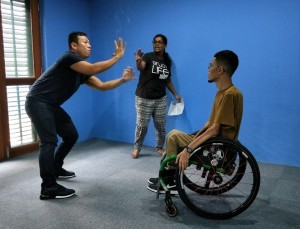
Peter Sau (left) and Grace Kalaiselvi (middle) workshops with Project Tandem mentee Danial Bawthan.
As part of their training, the emerging artists are assigned their own personal mentor – a freelance theatre practitioner with experience in creating original work. Peter had identified the potential mentors and carefully paired them up after discussions with both the mentors and mentees. There have been challenges throughout, whether it’s figuring out how to manage a group of participants with very different skills levels and performing experience, or ensuring that the mentors are challenging and pushing their mentees without going too far. He is honest in admitting that there are times when they don’t get it right, but believes that that is often when they learn the most as they are pushed to come up with creative solutions to unique situations.
“For example, when I – as a sighted person – work with one of our mentees, Lim Lee Lee – who is a guide dog user – I would ask her to project [her voice] by saying, ‘I’m here, reach me, I’m 10 metres away from you’,” says Peter. “She can only retain it for around 10 minutes. I would get frustrated and question why she keeps drawing back, but then she told me, ‘that’s because I have never seen anything and I can’t catch the distance cue.’”
Once Peter understood this, they ended up experimenting with different ways of measuring distance, and settled on using a piece of string that Lee Lee would hold on to, and Peter would tug at set distance intervals.
“Tactility is something that I’m learning,” he explains. “It made me realise that sound is more than just loud or soft; it needs to travel not just to reach you, but to touch you. That’s just one very small instance where working with a D/deaf or disabled mentee has opened up what I had previously been comfortable with.”
For the mentees, the biggest challenge is often working with their mentors to present their personal stories in a way that they are comfortable with. Lily Goh, for instance, is an artist who has been exploring visual theatre through song-signing, body movements, and percussion music. She was initially given a poem about disability and discrimination – inspired by her lived experience – that she would perform through choreography and physical movements. When she shared with her mentors, Peter and Zhuo Zihao, that she did not feel connected to the piece, they had a discussion and she was encouraged to try telling a story in her own way. Lily ended up creating a very personal monologue that reveals the communication barrier between herself and her non-signing family members. She even agreed to combine sign language with spoken language, despite her nervousness.
“This is my first time doing a showcase with sign language and voice. I am concerned about how the audience will react to my use of speech and sign language – it has been decided that there will be no captions for the signing-impaired, as in the hearing folks who do not know sign language – so I worry that my speech may become unclear to them,” she says. “But most of the shows presented by hearing actors don’t provide captions for the D/deaf audience either, so they can experience the same problem [that we usually face] this time!”
Peter remembers how the team was blown away by how powerful Lily’s piece is when she first performed it for them.
“We learnt that a D/deaf person need not always be non-speaking, as long as they know the reason for why they’re doing it, and they’re open to it,” he says. “And it was the authenticity and power of her emotions that moved us, more than the fact that she was speaking. The spoken word became an access tool for us.”
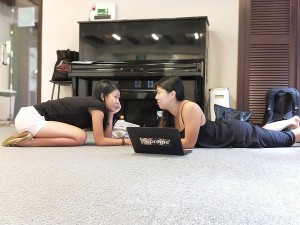
Emerging artist Claire Teo (left) discusses her ideas with her Project Tandem mentor, Shannen Tan (right).
Similarly, Claire Teo, a student who is pursuing a Diploma in Performance at Lasalle, also went through several drafts for her monologue with Peter, Shai and her mentor, Shannen Tan. Her initial piece was about a personal experience of being made use of as a visually impaired performer for publicity and inspiration purpose. Later, she wanted to change the subject matter, so Shai and Peter did a three-hour interview with her, and they came up with the idea of having Claire take on the role of a life coach to talk about “eight rules of surviving life”. At the time of our interview with Claire, rehearsals for the piece had yet to begin and she wasn’t sure whether she’s fully comfortable with how it will come across (she describes it as “very cynical – like a dark comedy”), but she was looking forward to working on it with Shannen.
“I think what makes this mentorship work is that we are both very open-minded to each other’s criticism and suggestions,” Claire explains. “She is not offended. She will accept that something isn’t working, and she’ll work on it. I like that [attitude].”
These situations can be tricky to navigate, and requires a lot of trust and patience on everyone’s parts. But over the past 15 months, Peter has started to realise and accept that the challenges are, indeed, part of the journey. The important thing is that they keep learning – not just for mentees to learn from mentors, but vice versa, too.
“We realised that in a Singaporean context, failing is a very big problem to us,” he says with a laugh. “But I have learnt to accept that I should fail together with them, and understand that failure is the way to actually take the step forward to produce work that we are happy about. It’s about co-learning. It’s about putting down what you think is right, and to be curious about what the other person can offer, and co-nudging each other forward.”
As for what comes after the July showcase, Peter would personally like to work towards a full ticketed production that would be open to the public, provided everyone is on board with that, too.
“We co-own this work and we cannot move on without them wanting to move on,” he says. “So we shall see.”
But regardless of where the Project Tandem team goes from here, they are already making a stand to say that they are here, and they will persevere – together.
By Gwen Pew
Published on 6 July 2018
A closed-door showcase of Project Tandem’s Making A Stand will be taking place at Centre 42 on 21 and 22 July 2018. Find out more about the group’s journey here.

